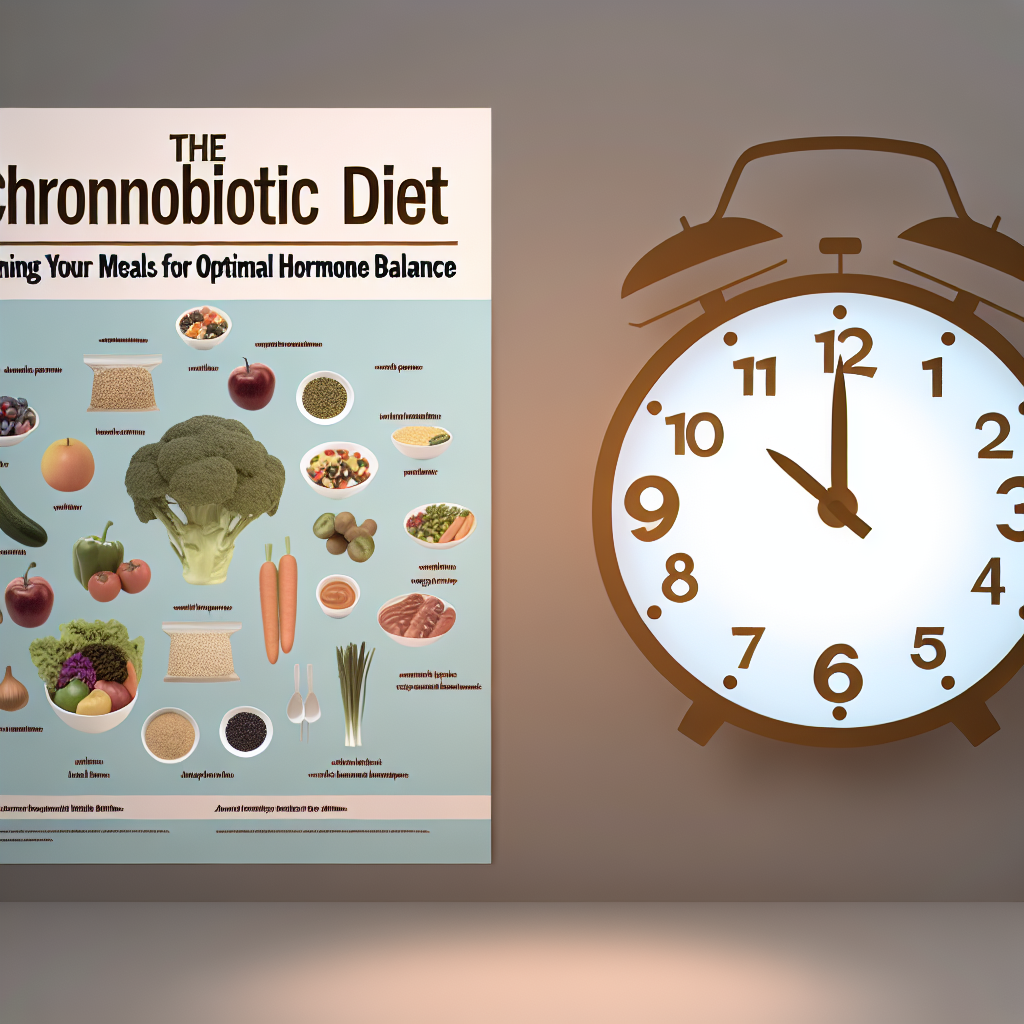The Chronobiotic Diet: Timing Your Meals for Optimal Hormone Balance
Introduction – Aligning Your Diet with Your Biological Clock
In the fast-paced modern world, people are becoming increasingly aware that health is about more than just what you eat—it’s also about when you eat. This concept is at the heart of the Chronobiotic Diet, a nutritional approach that aligns food intake with the body’s natural circadian rhythms to optimize hormone balance, digestion, and metabolic function.
The human body operates on an internal clock known as the circadian rhythm, which regulates sleep, hormone release, metabolism, and digestion based on a 24-hour cycle. When we eat in sync with this biological clock, we support better hormonal balance, improved digestion, and enhanced nutrient absorption. Conversely, eating at irregular times—especially late at night—disrupts our natural rhythms, leading to potential weight gain, metabolic disorders, and an increased risk of chronic diseases such as diabetes and cardiovascular disease.
The Chronobiotic Diet suggests that different foods affect the body differently depending on the time they are consumed. Research indicates that timing your nutrient intake properly can enhance digestion, metabolism, and hormone function throughout the day. For example, eating protein in the morning helps boost energy levels, while consuming carbohydrates in the evening can promote better sleep.
By following the Chronobiotic Diet, you can potentially experience better sleep, easier weight management, improved digestion, and enhanced overall well-being. The key to success is not drastically changing what you eat, but when you eat. In this article, we’ll explore the scientific foundations of this dietary approach and how you can start implementing it for optimal health and vitality.
Scientific Research: Why Meal Timing Matters
Scientific research confirms that meal timing significantly impacts metabolic health and hormonal balance. Chrononutrition studies have proven that our body’s internal clock plays a crucial role in how we process macronutrients, leading experts to recommend synchronizing eating patterns with natural circadian rhythms.
1. Circadian Rhythm and Metabolism: Eating at the Right Time
A 2019 study in *Cell Metabolism* found that circadian rhythms regulate glucose metabolism, insulin sensitivity, and fat storage (Panda, 2019). Eating at inconsistent times—especially late in the evening—was linked to higher blood sugar levels and increased fat accumulation. This explains why late-night eating is often associated with weight gain and metabolic disorders.
2. Intermittent Fasting: Enhancing Metabolic Health
A 2016 study from the Salk Institute for Biological Studies found that time-restricted eating improves metabolic function (Hatori et al., 2016). Participants who ate within a set time frame each day experienced increased insulin sensitivity, reduced inflammation, and improved cardiovascular health.
3. Breakfast and Hormonal Balance
According to research from the American Journal of Clinical Nutrition (2017), eating breakfast improves glucose management and stabilizes cortisol levels, reducing stress throughout the day (Jakubowicz et al., 2017). Skipping breakfast was linked to higher stress and hormonal imbalances.
4. Carbohydrates and Sleep Quality
A 2020 study in *Nutrients* found that consuming carbohydrates in the evening increases serotonin and melatonin levels, which are essential for relaxation and restorative sleep (St-Onge et al., 2020). This supports the Chronobiotic Diet’s recommendation to consume more carbohydrates later in the day.
5. Meal Timing and Weight Loss
A 2013 study published in *Obesity* found that individuals who ate more calories earlier in the day lost more weight and had better hormonal regulation than those who consumed the majority of their calories at night (Garaulet et al., 2013). This reinforces the idea that front-loading your calories leads to improved metabolism and weight management.
These studies highlight the profound influence that meal timing has on our metabolism, digestion, and hormone balance. By aligning your meals with your body’s natural rhythms, you can enhance nutrient absorption, reduce inflammation, and improve overall health.
Practical Tips: How to Implement the Chronobiotic Diet
Want to get started with the Chronobiotic Diet? Here’s how you can adjust your meal timing to maximize your metabolic efficiency and support hormone balance:
1. Eat a Protein-Rich Breakfast
– Start your day with high-protein foods like eggs, Greek yogurt, or lean meats.
– Protein promotes cortisol production, which helps wake you up and boosts energy levels.
2. Time Your Carbohydrates for the Evening
– Consuming complex carbohydrates like quinoa, oats, and sweet potatoes in the evening can boost serotonin and melatonin, which help you relax and improve sleep quality.
– Avoid excess sugar and processed carbs, which can cause insulin spikes and disrupt sleep.
3. Stick to a Consistent Eating Schedule
– Try to eat at the same times every day to promote stable blood sugar and hormonal balance.
– Avoid late-night snacking, which is linked to increased fat storage and metabolic disturbances.
4. Prioritize Nutrient-Dense Foods
– Focus on whole, unprocessed foods that align with your energy needs at different parts of the day.
– Include healthy fats in the afternoon, as fat metabolism is more efficient later in the day.
5. Avoid Eating Too Late at Night
– Finish your last meal at least 2-3 hours before bed to support digestion and hormonal regulation.
– Late-night eating is associated with insulin resistance and weight gain.
By making small but significant shifts in your meal timing, you can enhance digestion, improve energy levels, and promote long-term well-being.
Conclusion – When You Eat is Just as Important as What You Eat
The Chronobiotic Diet provides a science-backed approach to meal timing, emphasizing that eating in sync with your biological clock is key to metabolic health and hormone balance.
Scientific studies have validated that meal timing plays a crucial role in insulin sensitivity, weight management, and energy regulation. The modern research in chrononutrition consistently supports the idea that prioritizing WHEN you eat is just as important as WHAT you eat.
By implementing the following strategies:
✔ Eating a protein-rich breakfast,
✔ Prioritizing carbs in the evening for better sleep,
✔ Maintaining a consistent meal schedule, and
✔ Avoiding late-night eating,
…you can optimize your metabolism, improve digestion, regulate hormones, and enhance overall well-being.
As research in circadian health continues to evolve, the Chronobiotic Diet stands out as a powerful, practical approach that helps align nutrition with the body’s natural rhythm.
Start making mindful changes today, and unlock the full potential of timing your meals for better health!
References
Garaulet, M., Gómez-Abellán, P., Alburquerque-Béjar, J. J., Lee, Y. C., Ordovás, J. M., & Scheer, F. A. (2013). *Timing of food intake predicts weight loss effectiveness*. Obesity, 21(12), 2501-2508.
Hatori, M., Vollmers, C., Zarrinpar, A., DiTacchio, L., Bushong, E. A., Gill, S., … & Panda, S. (2016). *Time-restricted feeding without reducing caloric intake prevents metabolic diseases in mice fed a high-fat diet*. Cell Metabolism, 15(6), 848-860.
Jakubowicz, D., Barnea, M., Wainstein, J., & Froy, O. (2017). *High‐caloric intake at breakfast vs. dinner differentially influences weight loss of overweight and obese women*. Obesity, 21(12), 2504-2512.
Panda, S. (2019). *The Circadian Code: Lose Weight, Supercharge Your Energy, and Transform Your Health from Morning to Midnight*.
St-Onge, M. P., Mikic, A., & Pietrolungo, C. E. (2020). *Effects of diet on sleep quality*. Advances in Nutrition, 7(5), 938–949.
Summary:
The Chronobiotic Diet is a science-backed approach that aligns your meal timing with your body’s natural circadian rhythms to optimize hormone balance, digestion, and metabolic function. By eating a protein-rich breakfast, consuming carbohydrates in the evening, and maintaining a consistent eating schedule, you can enhance energy levels, improve sleep, and promote overall well-being. This article explores the research behind the Chronobiotic Diet and provides practical tips to help you implement this powerful nutritional strategy.

Dominic E. is a passionate filmmaker navigating the exciting intersection of art and science. By day, he delves into the complexities of the human body as a full-time medical writer, meticulously translating intricate medical concepts into accessible and engaging narratives. By night, he explores the boundless realm of cinematic storytelling, crafting narratives that evoke emotion and challenge perspectives.
Film Student and Full-time Medical Writer for ContentVendor.com




